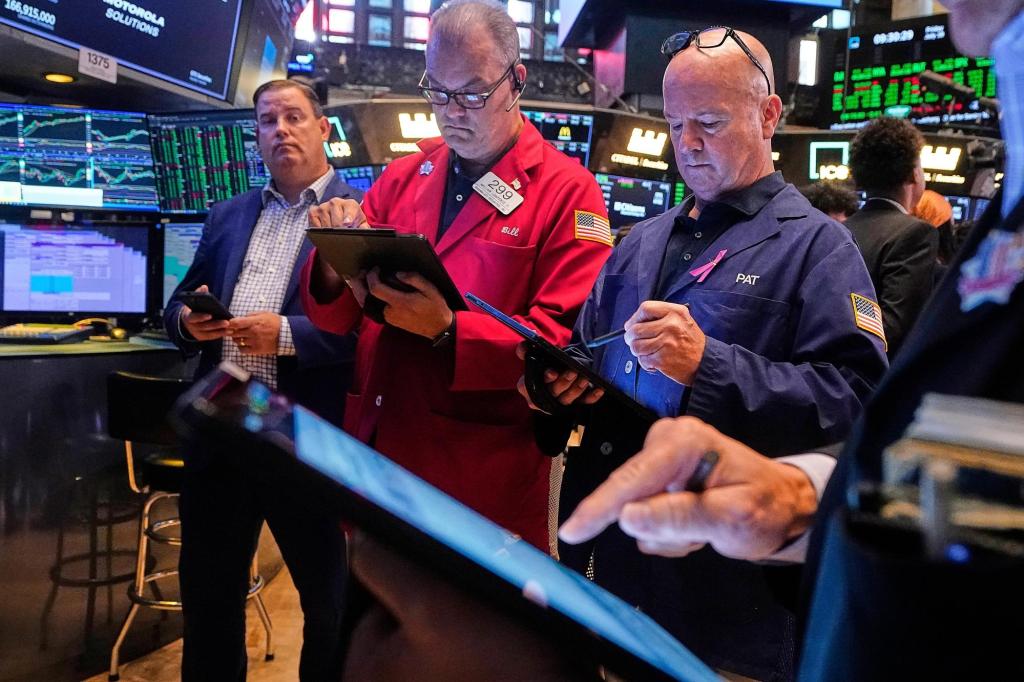
By ELAINE KURTENBACH and MATT OTT, Associated Press Business Writers
Wall Street was poised to open with gains Monday ahead of a busy week of corporate earnings reports.
Futures for the S&P 500, the Dow Jones Industrial Average and Nasdaq were all up more than 0.2% before the bell.
Markets have stabilized since spring, when President Donald Trump’s tariff announcements and pullbacks sent markets swinging wildly from day-to-day and sometimes hour-to-hour.
Trump pushed back the deadline for most countries to negotiate on tariffs to Aug. 1, which along with stronger-than-expected earnings reports, has helped to lift markets to record levels in recent weeks.
Domino’s Pizza jumped 5.2% in premarket trading Monday after posting strong same-store sales in the U.S., even though the pizza chain just missed Wall Street’s sales and profit targets.
Verizon climbed 4.6% after the phone and broadband giant beat analysts’ sales and profit targets and raised its full-year guidance.
Other companies reporting this week include General Motors, Coca-Cola, Tesla and Google parent Alphabet.
This week also will bring updates on U.S. home sales, jobless claims and manufacturing.
Bitcoin rose more than 1% to more than $118,500 early Monday, just off all-time highs. Trump on Friday signed into law the GENIUS Act, which sets initial guardrails and consumer protections for stablecoins, a type of cryptocurrency that is tied to assets like the U.S. dollar to reduce volatility.
Elsewhere, in Europe at midday, Germany’s DAX edged 0.1% lower, while the CAC 40 in Paris slipped 0.4%. Britain’s FTSE 100 was essentially flat.
Markets were closed for a holiday in Japan, where the ruling Liberal Democrats have lost their coalition majorities in both houses of parliament for the first time since 1955 following Sunday’s upper house election and the loss of their lower house majority in October.
A grim Prime Minister Shigeru Ishiba has vowed to stay on after the drubbing by voters frustrated over rising prices and political instability. Analysts said they expect his weakened government to crank up spending, adding to Japan’s huge debt burden.
Japan is also facing the imposition of 25% tariffs across the board on its exports to the U.S. as talks with the Trump administration appear to have made little headway.
“We expect short-term political instability to intensify due to the difficulties of forming a majority coalition, a likely change in leadership, and a potential deadlock in trade negotiations,” Peter Hoflich of BMI, a part of the Fitch Group, said in a commentary.
“Without a structural reset through snap elections, Japan is likely to face prolonged policy drift throughout 2026,” he said.
Chinese shares advanced after the central bank kept its key 1-year and 5-year loan prime interest rates unchanged. Hong Kong’s Hang Seng rose 0.7% to 24,994.14, while the Shanghai Composite index gained 0.7% to 3,559.79.
Recent improved economic data have eased pressure on the Chinese leadership to soften credit. Meanwhile, President Donald Trump’s administration has softened its criticism of Beijing, raising hopes that the two sides can work out a trade deal and avert the imposition of sharply higher tariffs on imports from China.
South Korea’s Kospi picked up 0.7% to 3,210.81 after the government reported a slight improvement in exports in June.
In Australia, the S&P/ASX 200 shed 1% to 8,668.20, while Taiwan’s Taiex dropped 0.2%. In India, the Sensex rose 0.3%. Bangkok’s SET gained 0.2%.
In other trading early Monday, U.S. benchmark crude oil reversed gains, leaving it essentially unchanged at $66.05 per barrel. Brent crude, the international standard, lost 8 cents to $69.20 per barrel.
The U.S. dollar fell to 147.55 Japanese yen from 147.98 yen. The euro climbed to $1.1667 from $1.1629.
Originally Published:



